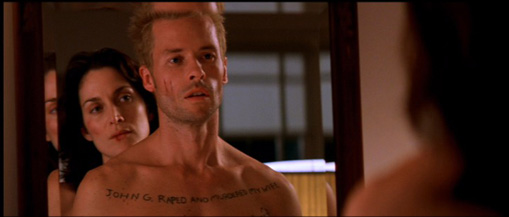|
|
Viking Night: MementoBy Bruce HallAugust 14, 2012
Leonard's notes lead him to a diner where he meets a disheveled woman named Natalie (Carrie Ann Moss). Obviously they've met before and though her outward agenda is to help, it's pretty clear she's leaving some things out. She hands him an envelope with damning information on Teddy. Teddy also seems to know Leonard pretty well. But there's something off about him, too. He repeatedly warns Leonard to leave town and avoid Natalie. But Natalie says the things he wants to hear, and because she's a beautiful woman, he feels compelled to trust her. Teddy is full of unpleasant observations that do not always match Leonard's carefully crafted information network of crazy tattoos and warped photographs. Some of them would make sense to someone who is able to remember things for longer than it takes to boil an egg, but Leonard is not that guy. So whom does he trust? Are any of these people what they seem? Good question. Leonard is very confident of his system, and believes it to be infallible. And his resolve is admirable; in his shoes, who wouldn't want to pick up where the law left off? But his System is only as good as his ability to correctly interpret what he’s looking at. Even to a normal person, a picture with a note scribbled on the back could mean one thing at the time you write it, something else later, and nothing at all to a stranger. And that’s the key - no matter how much information he collects, or how quickly he catches up each time, Leonard is always looking at things with the eyes of a stranger. I have to give Memento credit for maintaining a sense of credibility. The web of lies and deadly pitfalls Leonard stumbles into becomes obvious as early as halfway through the film, and knowing the ending doesn’t help. But while I insist the movie isn’t as complicated as it looks, making it appear that way was clearly a grind. Each scene is like one of Leonard's photographs; images without full meaning - just another maddening piece to the puzzle. If tattooing yourself is a good way to remember things, someone had to get some mad ink to edit this film. If you're the kind of person who likes to guess, Memento will send you barking up the wrong tree several times. Now imagine you're Leonard, a guy you could hit with a crowbar come back a half hour later to borrow 50 bucks from. It’s a gloriously painful ride, which is what makes the finale so satisfying. Once the context if the film's beginning/end is established, in that moment the entire story takes on a new light. Trust me - no matter how much Memento might confuse you - stick around. It's worth it. Like most great thrillers, Memento leaves you thinking. Thinking about what you just saw, and thinking about how it might apply to you. It’s all about context - the way we tend assume everyone sees things the same way we do. They don’t, they never will, and our collective failure to understand that is the true root of all the world’s problems. At least, that’s what Memento would have you believe.
|

|
|
|

|
Friday, November 1, 2024
© 2024 Box Office Prophets, a division of One Of Us, Inc.


